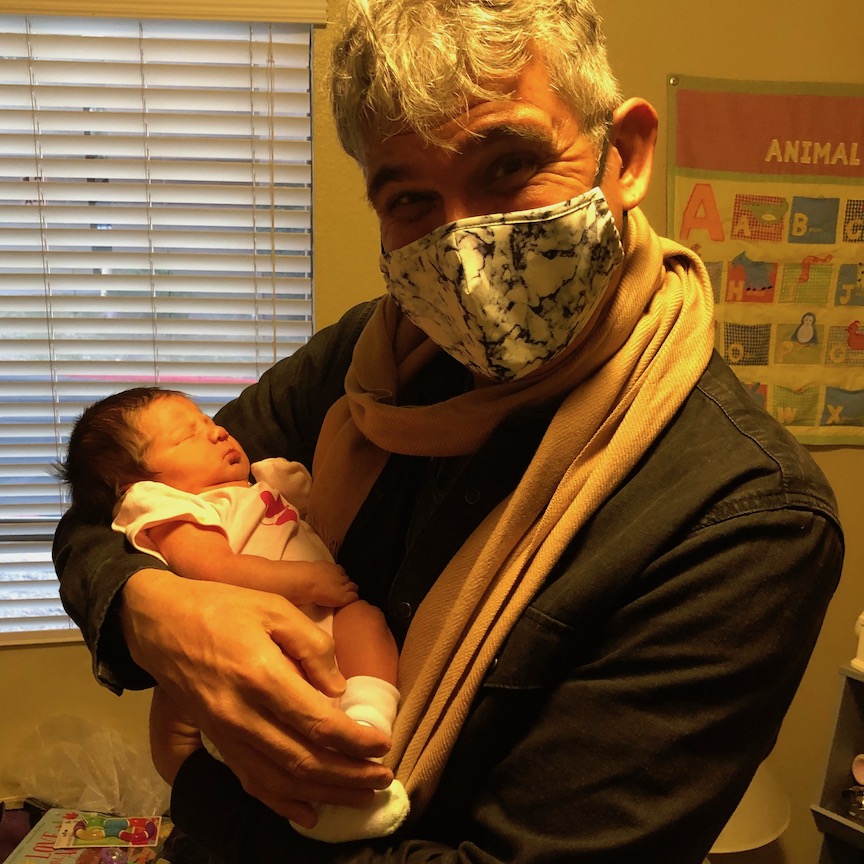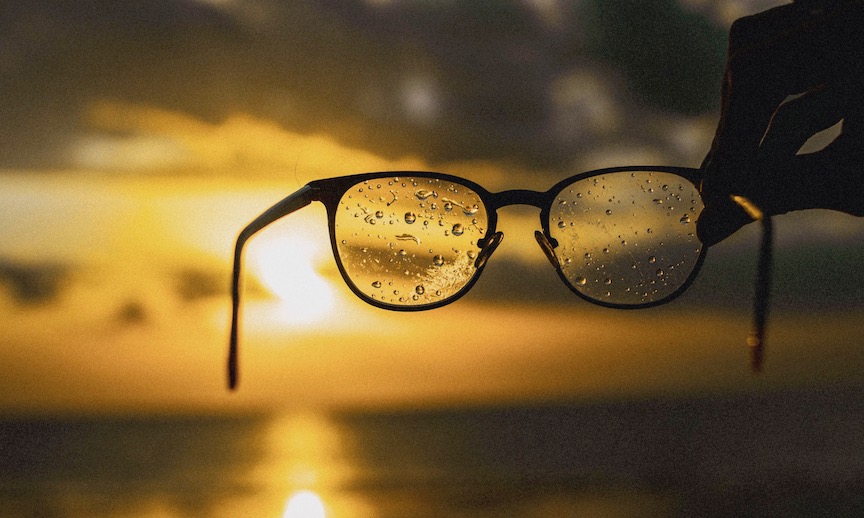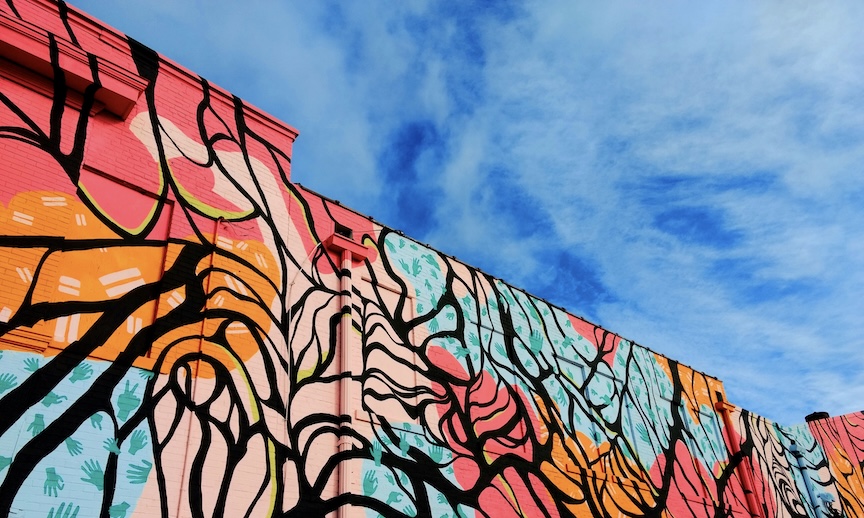RAISE A GLASS
At first, my title this week was meant to refer to the lenses through which we view the world — spectacles and windows and prisms — and to offer an encouraging invitation to raise these glasses on purpose, to gaze upon life intentionally. That’s still what I’m going to write about, mostly.
But I’ve also got to let you know that Travis and I became Grandpas this week! So, please, let’s also raise a glass of whatever festive beverage you enjoy in a toast to our precious new family member, Viviana. I’ll try not to overshare photos, but just this one. Here she is!

Okay, back to my original idea, and why I was thinking about it…
Stacks of books teeter on and around my bedside table. Excellent works of nonfiction on a variety of fascinating subjects that I pick up from time to time, when whatever thriller I’m reading becomes too consuming and keeps me awake longer than I want. With nonfiction, no matter how good it is, I usually only make it through a few pages before I can’t keep my eyes open any longer.
Different books get shuffled to the top of the piles from time to time, because they’ve toppled over or, more rarely, because I’ve dusted them. This happened not too long ago, and I was delighted to uncover a book about which I’d completely forgotten — Humankind: A Hopeful History, by Dutch historian Rutger Bregman. So far, I’ve only read the prologue and first chapter, and I know that it’s way premature for me to report on it. But the beginning touched me deeply, so I can’t wait. And, honestly, it might be weeks or months before I make it to chapter 2, so…
Bregman dismantles the persistent myth that humans generally are selfish and aggressive. He illustrates that during times of crisis, most people behave with kindness and generosity.
The media, the military, and the market all have tended to promote and benefit from the idea that individuals and societies will devolve into pandemonium at the first whiff of danger or lack. Religion and spirituality (even the progressive ones) have worked this angle, plenty, too — the premise there’s something about human being that needs fixing, saving, transcendence, evolution, self-help, and prayer in order to reach its potential/perfection.
But this conventional wisdom — that civilization teeters constantly on the brink of something out of “Lord of the Flies” — is not only a pathway to despair, IT IS ALSO ENTIRELY INACCURATE.
It is not how we’ve behaved during times of war, nor in the wake of natural disasters. It’s not who we are in tight-knit communities, nor with perfect strangers.
Images of holiday shoppers trampling each other to buy discounted electronics may make for rousing tv infotainment, but it’s not an accurate reflection of who we are when it really matters. Yeah, we can find and point to examples of toilet-paper hoarders, disaster profiteers, looters, and price gougers. But the amount of media play and attention on these scenarios notwithstanding, it is entirely demonstrable that they are exceptions to humanity’s heart, not its rule.
With real examples and data from different countries and cultures, spanning socioeconomic conditions, Bergman illuminates that our true nature is decency, compassion, good-humor, cooperation, courage, and care for each other.
Chapter One of Humankind: A Hopeful History is so darned beautiful that I’m going to do my darnedest to read the whole thing. I am compelled by its confident presentation.
I also love it as a justification of optimism. I feel vindicated, because I’ve been accused of wearing rose-colored glasses for most of my life.
I imagine that this is partly due to the fact that many (maybe most) of my nearest and dearest are pessimists. I don’t know why, but I am profoundly attracted to depressive tendencies; they’re hot. I’m like a moth drawn to the flame of cynical wit and sarcastic derision. Maybe it’s because after diving wing-first into incinerating bitterness — my own and others’ — I get to rise from those ashes and experience the subsequent satisfaction of redemption and hope. That’s how it feels to me anyway. To my loved ones, I’m sure it just sounds like a flip-flop into annoying Pollyanna-ism.
My brother once growled at me, when I was trying to look on the bright side of something, “Gee thanks! That’s great advice, An-drew. Let’s all get out our crystals and skip merrily down the yellow brick road into Candy Land under a rainbow of self-delusion!” (I’m trying to convey his sneer with italics. You can imagine it, right?)
The thing is — I totally get that. I’m right there with him if we’re calling out the disregard of difficult truths, willful ignorance, and denial of factual reality. Happy-ending, silver-lining spins that ignore or diminish suffering and hardship are both ineffective and insulting; we don’t get to skim blithely over the parts of life we don’t like.
AND… Still, I’d rather wear rose-colored glasses than shit-smeared glasses any day.
The point of wearing any glasses at all is to be able to view clearly. I’ve got bifocals because I’m an elderly grandad and because I want to be able to read close-up as well as have a gander at where I’m heading. I find it empowering to recognize and take responsibility for the glasses I’m wearing.
Seeing always involves a lot of interpretation. In fact, our eyes don’t really “see” anything; our eyes only transmit information. Our brains decode the meaning of this information, giving it significance relative to whatever story we’re telling about our life and the world.
And this world is a busy scene, with trillions of bits of data coming at us from every direction all the time. So it seems to me really useful to be able to put on some intentional glasses — call them rose-colored or mindful — just to begin to distinguish what’s real from the blur of cultural conversations, the filter of our own experience, and an evolutionary bias towards negativity.
Some of this is pretty basic power-of-positive-thinking stuff. But let me clarify that I am not in any way suggesting positivity as a distortion of reality. More like: optimism and hope as corrective lenses, helping us to see what’s true.
Because when we get honest and clear and true, then we can have powerful, courageous, and creative conversations. We can discern actual problems from dramatizing and self-defeating baloney. We can maximize our own astonishing gifts and collaborate with each other in the context of our collective brilliance, ingenuity, and essential goodness.
Friends, that’s the world that I want for my granddaughter. That’s the world in which I want to live. That’s the world that I choose. It’s the world in which I really believe, in my heart of hearts. And I know that we can create it together. If that’s too Pollyanna for you, then stick it in your cynical butt.
Join us online this weekend for music, message, and the magic of togetherness even while we’re apart. New stuff uploaded by 6:00 pm every Saturday, at bosquecsl.org and vimeo.com/bosquecsl. XOX, Drew
©2021 Drew Groves




